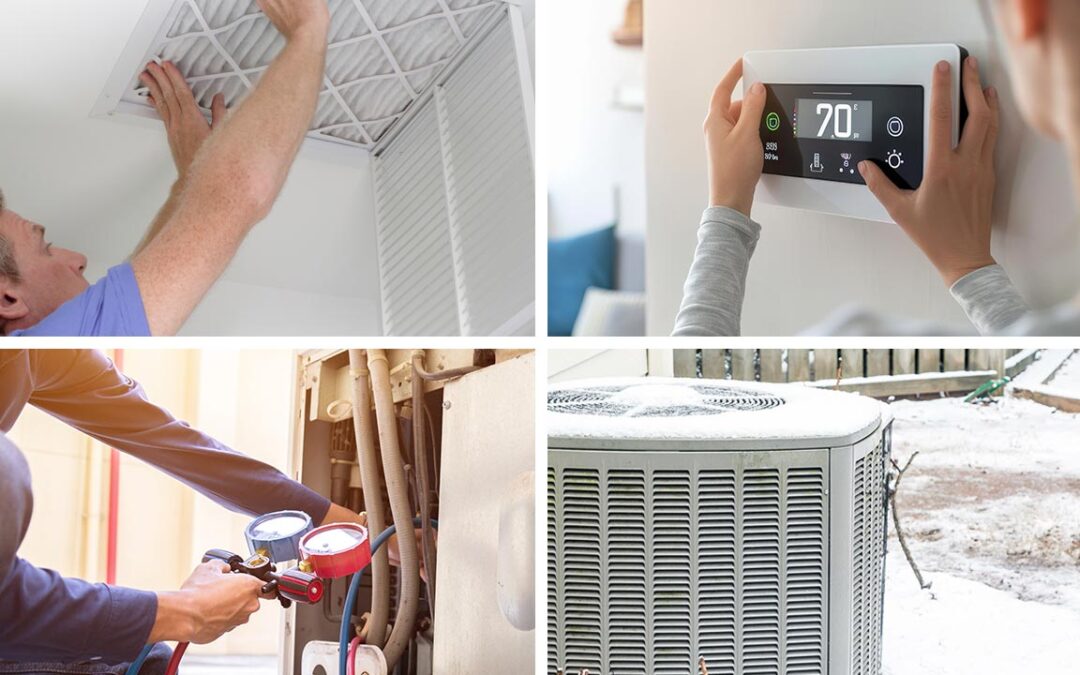As winter settles into Central Oregon, the last thing you want is an HVAC system that isn’t ready for the cold. Winterizing your system ensures your home stays warm, comfortable, and energy-efficient throughout the holiday season. Taking a few proactive steps now can prevent costly repairs later and help you make the most of your heating system. Don’t know where to start? Below, we cover valuable tips and guidance on how to properly winterize your HVAC system.
Why You Should Winterize Your HVAC System
Winterizing your HVAC system is essential for maintaining its performance and efficiency during the colder months. As Central Oregon homeowners, we often experience significant temperature fluctuations, from freezing temperatures in winter to hot summers, putting extra strain on HVAC systems. Winterizing ensures that it operates efficiently, reduces energy consumption, and prolongs its lifespan.
It also helps to:
- Prevent Frozen Pipes: Cold temperatures can cause pipes to freeze and potentially burst, leading to costly repairs and water damage.
- Improve Efficiency: A well-maintained system operates more efficiently, reducing energy consumption and saving you money on utility bills.
- Extend Lifespan: Winterizing your system can help extend its lifespan by protecting it from harsh winter conditions.
- Ensure Safety: A properly winterized system reduces the risk of carbon monoxide poisoning and other safety hazards.
1. Change or Clean Your Air Filters
One of the simplest yet most important tasks when you winterize an HVAC system is checking your air filters. Dirty or clogged filters make it harder for your HVAC system to circulate warm air, which can reduce efficiency and increase energy costs.
As a general rule, replace filters every one to three months during the heating season, especially if you have pets, allergies, or a medical condition. Clean filters ensure smooth airflow and help your HVAC system run efficiently while improving indoor air quality—something that’s especially important when your home is closed up tight for winter.
2. Inspect and Clean Vents and Ductwork
Your HVAC system relies on clean ducts and vents to deliver warm air evenly throughout your home. Over time, dust, pet dander, and other debris can build up inside your ductwork, restricting airflow and causing your system to work harder.
Before winter hits full swing, inspect your vents for any obstructions and vacuum them if needed. For a deeper clean and to seal any cracks or openings, consider scheduling a professional servicing. This will not only improve airflow but also enhance comfort and optimize energy efficiency throughout the winter.
Pro Tip: Make sure all vents are open and unblocked by furniture or rugs. Closing vents can disrupt your system’s balance and strain the unit—in HVAC terms, this is what is known as static pressure.
3. Check Your Thermostat
Your thermostat plays a major role in keeping your home comfortable during the colder months. As you winterize the HVAC system, test your thermostat to ensure it’s functioning properly. If you’re still using a manual thermostat, now is a great time to consider upgrading to a programmable or smart thermostat.
With a smart thermostat, you can adjust the temperature settings according to your schedule. Lowering the temperature while you are away or asleep can help save energy and reduce heating costs. Consider setting the thermostat to a lower temperature (but not too low) when you are not at home and gradually increasing it when you return to ensure comfort without setting off your heat strips if you have any. Depending on your system (such as a heat pump), a setback that is too low will make it work harder than simply letting it sit at a regular indoor temperature.
4. Schedule a Professional HVAC Inspection
The best way to winterize your HVAC system is to have it inspected and tuned up by a professional technician. During an HVAC tune-up, a technician will:
- Inspect the system for any signs of wear or damage.
- Check and tighten electrical connections.
- Lubricate moving parts to ensure smooth operation.
- Clean components, including the blower motor and heat exchanger.
- Test the system for efficiency and safety.
Routine maintenance not only ensures your system is ready for the winter workload but can also extend its lifespan and improve overall performance. At Bend Heating & Sheet Metal, we recommend annual maintenance to keep your HVAC system in peak condition.
5. Seal and Insulate Your Home
Your HVAC system will work much harder if warm air is escaping through cracks, gaps, or poorly insulated areas in your home. These typically show up around windows, doors, and vents. Use weatherstripping or caulking to seal any leaks and prevent heat loss.
A well-sealed home allows your HVAC system to heat more efficiently, keeping energy bills in check.
6. Protect Your Outdoor Unit
If you have an outdoor heat pump or AC unit, winterizing it is essential to prevent damage caused by snow, ice, and debris. First, clear away any leaves, dirt, or vegetation around the unit to allow proper airflow. While it’s not necessary to cover a heat pump (they’re designed to operate year-round), you can use a breathable surround to protect it from heavy snow accumulation. Note that there needs to be a minimum of two feet in front of the unit to breathe correctly if you installed a surround.
For homes with central air conditioning systems that aren’t in use during winter, you can cover the outdoor unit to shield it from the elements. Just make sure the cover is loose enough to prevent moisture buildup, which could lead to rust.
Stay Warm All Season Long
Taking the time to winterize an HVAC system will give you peace of mind as we move through this Central Oregon winter. From changing filters and sealing drafts to scheduling a professional tune-up, these steps will keep your system running efficiently and your home warm and comfortable.
Need help getting your systems at peak efficiency? Bend Heating’s team of professionals is here to ensure your system performs its best all season long.
